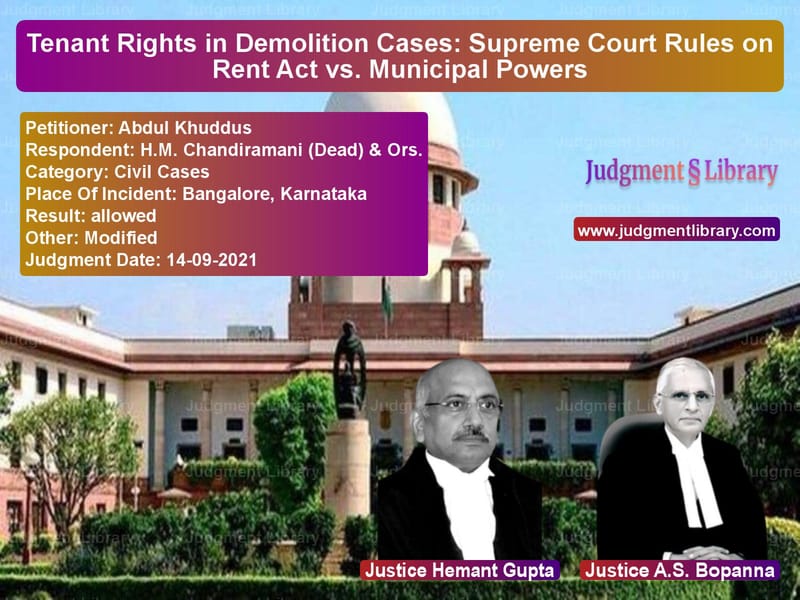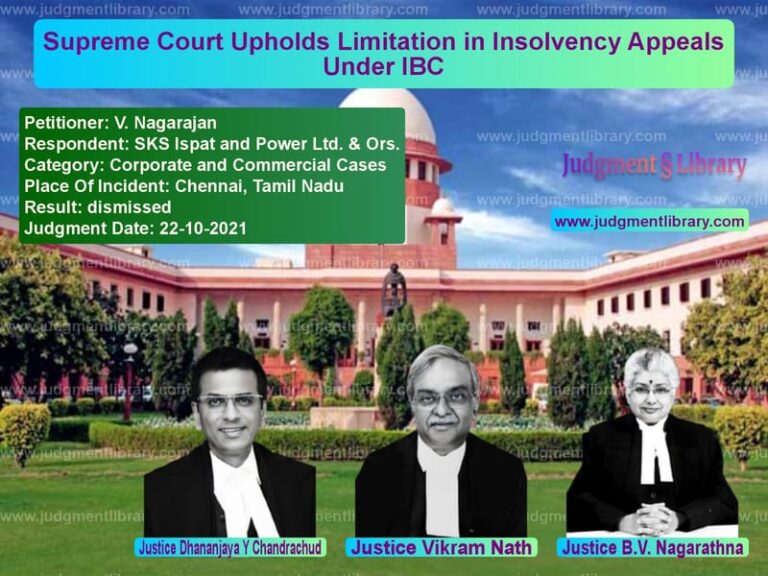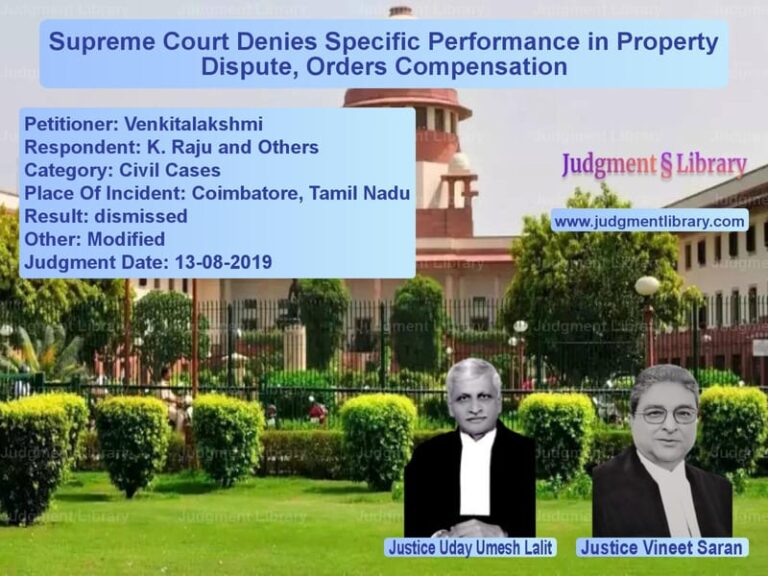Tenant Rights in Demolition Cases: Supreme Court Rules on Rent Act vs. Municipal Powers
The case of Abdul Khuddus v. H.M. Chandiramani (Dead) & Ors. revolved around the demolition of a rented property and whether the tenant retained the right to possession after the structure was removed by municipal authorities. The Supreme Court examined whether the Karnataka Rent Control Act protected the tenant or if the Bangalore City Corporation’s demolition order under the Karnataka Municipal Corporations Act had legal supremacy.
Background of the Case
The case involved premises located at 50, Ebrahim Saheb Street, Civil Station, Bangalore. The appellant, Abdul Khuddus, purchased the front portion of the building on March 18, 1994, while the respondent, H.M. Chandiramani, was an existing tenant of the first floor under an allotment order from the Rent Controller dated May 7, 1974.
The dispute arose when the Bangalore City Corporation issued a notice under Section 322 of the Karnataka Municipal Corporations Act, 1976, stating that the building was dilapidated and required demolition. Despite obtaining a stay order from the Karnataka High Court, the building was ultimately demolished on January 9, 1995. The tenant filed two suits—one for an injunction and another for damages. The trial court ruled in favor of the tenant, but the Karnataka High Court overturned part of the decision. The case reached the Supreme Court.
Key Issues Before the Supreme Court
- Whether a tenant has rights over the land after the demolition of the building.
- Whether municipal demolition orders under the Karnataka Municipal Corporations Act override tenancy protection under the Karnataka Rent Control Act.
- Whether the demolition was carried out in a legally valid manner.
- Whether the tenant was entitled to damages for the loss of business and property.
Arguments by the Appellant (Property Owner)
The appellant, Abdul Khuddus, contended that:
- The demolition was carried out legally after due notice and inspection.
- The Rent Control Act governs landlord-tenant disputes but does not prevent municipal authorities from demolishing unsafe buildings.
- The tenant lost all rights once the building was removed.
- The High Court erred in holding that the Rent Control Act prevails over the Municipal Corporations Act.
Arguments by the Respondents (Tenant’s Legal Heirs)
The tenant’s heirs argued that:
- The demolition was carried out hastily without adequate notice.
- The tenant had statutory protection under the Karnataka Rent Control Act, which allowed continued possession even if the building was destroyed.
- The owner had colluded with municipal officials to evict the tenant through demolition.
- The tenant was entitled to compensation for loss of business and property.
Supreme Court’s Analysis
The Supreme Court, comprising Justices Hemant Gupta and A.S. Bopanna, reviewed the legal framework and past precedents.
Key Findings
- Municipal Act Prevails in Public Safety Matters: The Court held that municipal demolition powers take precedence over tenancy rights when public safety is at stake.
- Tenant Has No Automatic Right to Re-Enter Land: The Court ruled that tenancy rights protect a tenant’s occupation of a structure, but not the land itself if the structure is removed lawfully.
- Demolition Was Lawful but Hastily Executed: The Court found that while the Corporation followed procedure, it did not give a full three-day notice before demolition.
- Compensation Awarded Instead of Reinstatement: The Court ordered compensation of ₹5,00,000 to the tenant’s heirs instead of reinstatement.
Key Observations by the Supreme Court
“The Karnataka Rent Control Act provides protection to tenants, but it does not override municipal laws that address public safety concerns.”
“Statutory tenancy does not extend to an automatic right over the land after the tenanted building ceases to exist.”
Final Judgment
The Supreme Court ruled:
- The Karnataka High Court’s decision was set aside.
- The tenant’s claim for possession was dismissed, confirming that the tenancy ended with the demolition.
- The tenant’s legal heirs were awarded ₹5,00,000 as compensation for loss of property and business.
- The compensation must be paid within two months, failing which interest at 6% per annum would apply.
Implications of the Judgment
This ruling has significant implications:
- Clarifies the Scope of Rent Control Laws: The judgment confirms that rent control protections apply to buildings, not the underlying land.
- Municipal Authorities Can Take Action on Unsafe Buildings: The ruling affirms that public safety concerns justify demolition even if tenants occupy a building.
- Precedent for Tenant Compensation: The decision establishes that tenants may be entitled to damages but not reinstatement if a lawful demolition occurs.
Conclusion
The Supreme Court’s decision in Abdul Khuddus v. H.M. Chandiramani clarifies that rent control protections do not override municipal laws designed to protect public safety. While the Court found that demolition was lawful, it recognized that the tenant suffered a loss and awarded compensation. This ruling ensures a balance between tenancy rights and municipal authority in urban planning cases.
Petitioner Name: Abdul Khuddus.Respondent Name: H.M. Chandiramani (Dead) & Ors..Judgment By: Justice Hemant Gupta, Justice A.S. Bopanna.Place Of Incident: Bangalore, Karnataka.Judgment Date: 14-09-2021.
Don’t miss out on the full details! Download the complete judgment in PDF format below and gain valuable insights instantly!
Download Judgment: abdul-khuddus-vs-h.m.-chandiramani-(d-supreme-court-of-india-judgment-dated-14-09-2021.pdf
Directly Download Judgment: Directly download this Judgment
See all petitions in Landlord-Tenant Disputes
See all petitions in Property Disputes
See all petitions in Damages and Compensation
See all petitions in Judgment by Hemant Gupta
See all petitions in Judgment by A. S. Bopanna
See all petitions in allowed
See all petitions in Modified
See all petitions in supreme court of India judgments September 2021
See all petitions in 2021 judgments
See all posts in Civil Cases Category
See all allowed petitions in Civil Cases Category
See all Dismissed petitions in Civil Cases Category
See all partially allowed petitions in Civil Cases Category







